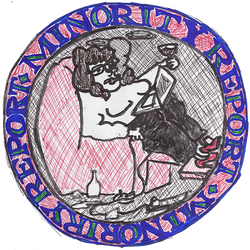Amidst the Greek-government debt crisis, documenta 14 in Athens latched onto the rather reductive idea of a “legendary Greece”, birthplace of democracy and pioneer of the southern European culture of anti-systemic politics and rioting. From the Athenian owl motif and logo through to endless coin collections and the Parthenon of Books there was a dangerously one-dimensional nationalism that recalled the 2004 Olympics in that it both aggravated and conveniently glossed over the steady rise of patriotism and the extreme right in Greece. Yet documenta 14 strived to position themselves as a bohemian countercultural endeavour, fighting against the perils of neo-liberalism, injustice and inequality—right down to the finer details, such as setting up their offices in Exarchia, the “anarchist square” and dedicated rioting area. For one of the most prestigious contemporary art exhibitions in the world with a €37.5 million budget (and allegedly €7 million in the red), this was a bewildering setup. While in Athens last year, I talked to Fil Ieropoulos, artist, academic and one of the curators for the 6th Athens Biennale, Waiting for the Barbarians, about break-ins, cover-ups, fascist spectacles and the current milieu of “political art”.
AS: I keep hearing that Athens is the new Berlin. How does it feel to be a part of the new arts hub?
Fil Ieropoulos: Athens is a lot like Berlin at the moment in the sense that it’s cheap and there are big warehouse spaces and there’s an interesting transformation with the refugees. I do think it’s an interesting space. I just don’t really think it’s a city of art as much as it’s been projected to be. A city that has only one fine arts school that does 60% sculpture and painting is not really a city of buzzing conceptual art.
AS: I guess documenta really latched onto the perceived political environment of Athens as a place for protest/unrest more than its artistic output anyway.
FI: One of my major issues with the documenta discourse is the one of liberalist rioting/dissent. They are purposely overlooking major problems in Greek society, such as how massively racist it is. It’s the most anti-Semitic country in Europe, which is easy to see in terms of numbers. There has been a steady rise of patriotism and the extreme right in Greece. So all of these discourses are not dealt with in the name of portraying the Greek people as the victims of neoliberalism and so on. I’m not saying that they aren’t but the narrative is much more complex than that.
Anyone whose discourse was more complicated than what documenta wanted to present was not included in their programme. Anybody for example from the Anti-Greek league; anyone whose work deals with the idea that we have to break away from this conception of Greece as this legendary nation in order to actually improve our lives instead of living in some sort of delirium. The people who were chosen were those that could be instrumentalised in the creation of the Greek anti-capitalist (and possibly anti-European) hero. Anything that was more complex, including some queer narratives, was indirectly silenced by not being chosen to take part. For me to see documenta claim that they have an important queer narrative going hand in hand with a sort of localist patriotism was quite absurd. The queer movement that I was aware of in Greece was always a more global movement.
AS: How did you see the Greek hero or the idea of a “legendary Greece”, birthplace of democracy, appearing most strongly in documenta and what was your initial reaction?
FI: When the Parthenon of Books was announced, we really felt that ancient Greece produced a lot of problematics connected with the return to the “big Europe” (the enlightened Europe versus the barbarians of Asia). The Parthenon was a favourite of Hitler, Stalin and all that. We screamed those things out. We don’t think that Ancient Greece is to be thrown away but you cannot unproblematically, at this particular juncture, just have a Parthenon.
And what is the artwork dealing with? Censorship and freedom of speech. But where are we at the moment with the freedom of speech stuff? The closest contemporary European concept to “freedom of speech” is a pretty reactionary anti-Islamic movement. Internationally, “freedom of speech” is something that Donald Trump advocates for—against political correctness. Really, at this particular moment, speaking of freedom of speech is really not a great thing. It’s moved on from Argentina in the 70s.
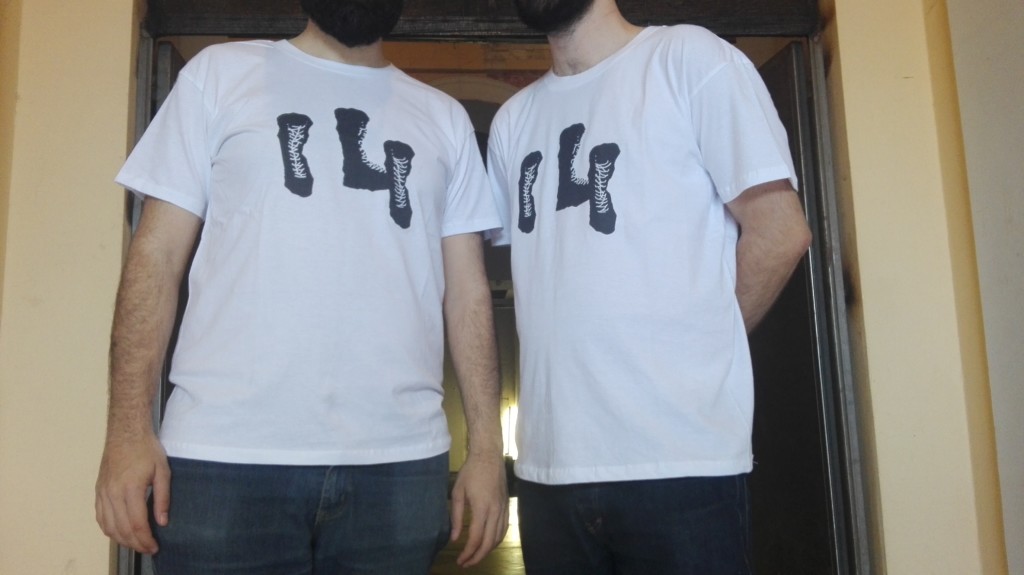
AS: Yes, “freedom of speech” is a very American concept. It’s not something that is a part of our constitution in Australia. There is no First Amendment here, but the concept is nevertheless used as a naked assertion of power and entitlement that transforms “liberty” into expressions of suprematism. “Freedom” is thinned to its market meanings in documenta with Ancient Greek references popping up regularly—from the owl symbol to words such as “elefthería”.
FI: I wasn’t initially negatively preoccupied with documenta. I thought it could be good, but “Learning from Athens”… They said that because the word “freedom has been corrupted” they are bringing in the Greek word “elefthería” (ελευθερία) but this fundamentalist approach to the Greek language is terrible—all the Greek Nazis talk about the superiority of the Greek language and its purity. Conceptually it’s also false because the free market is the same term in Greek so it doesn’t really make sense. They didn’t speak to linguists. Everything was this extremely superficial fetishisation of the Greek imagination and for me what’s interesting is that northern Europeans love to imagine the Greek subject.
If you look back to the creation of the Greek state in 1829 it was the imagination of Lord Byron and his friends in the UK and so on. This concept of the Greek fighter, interestingly placed between Asia and Europe—exotic but still “enlightened European”. The people from our side who have thought about all this colonial rhetoric hoped that documenta wouldn’t be that simplistic, but it was.
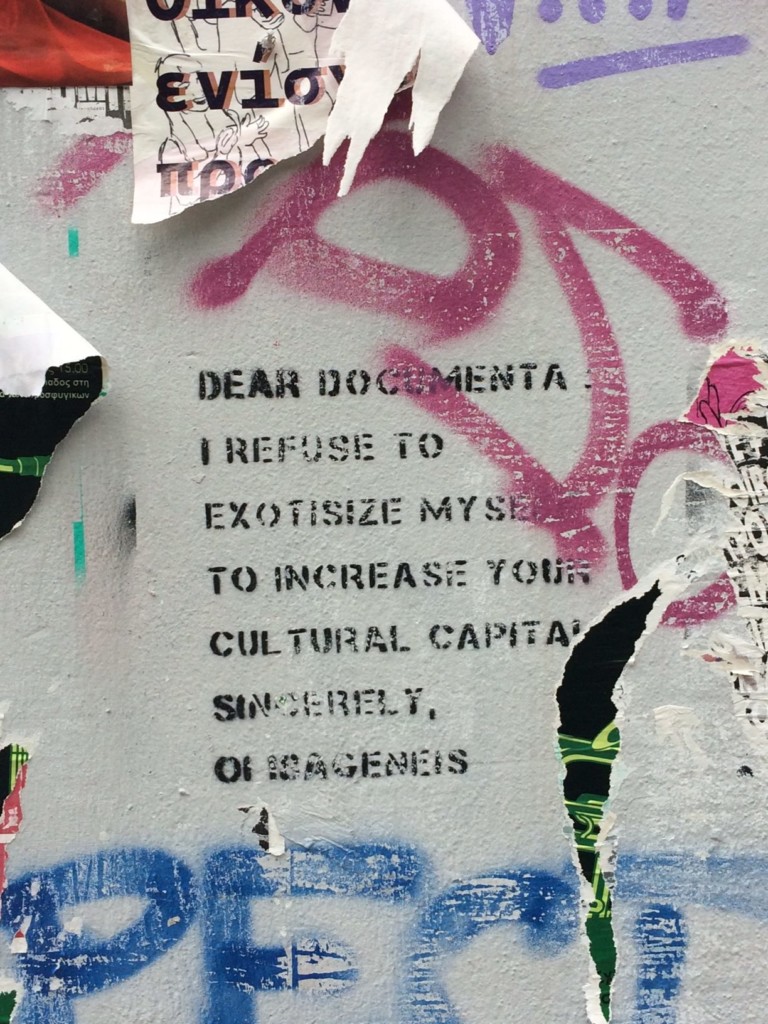
AS: “South” is something that came up a lot in terms of positioning Greece geographically within Europe but also making a clear distinction between Greece and “the rest” of Europe. Even the official documenta publication was called South as a State of Mind. What does that even mean?
FI: The main discourse was about Greece, land of the south, land of disobedience. The last Paul Preciado text was “Embrace Your Inner South”—hugely problematic notions of Greece as south. Is Greece south?? South of what? It’s part of Europe so it’s part of the big gang of colonialism. It’s not really the global south.
AS: In Australia we are south-er.
FI: Indeed you are and I am sure that this has its own complex repercussions. There are particularly traumatic moments in the history of Greek patriotism and ultra-nationalism. The last major thing was the time around the Olympics in 2004. It boosted ultra-nationalism in a terrible way while at the same time, bringing the country to financial catastrophe because this was the beginning of the end. Extreme spending, the impression that a lot more money was available, general price hikes.
AS: What was Athens like around the time of the Olympics?
FI: The years 2004 and 2005, around the time of the Olympics, Greece won the European football championship and Eurovision Song Contest so there were weeks that were unbearable for those of us that are critical. People were marching with flags every weekend throughout the squares, it was utter dystopia. Around that time there were even random pogroms against immigrants on the streets and the whole “Golden Dawn” thing was coming up. Personally, I think that to see the connection between the Olympics and the rise of the Golden Dawn is obvious—it’s Google search material.
What does the Olympics do? It comes, reshuffles things, generally leaves the place in debt, creates a fascist spectacle and moves on. There’ve been a couple of exceptions where it brought something useful to local communities but very rarely.

AS: With your various projects, particularly Documena, how did you seek to critique documenta?
FI: It’s been extremely difficult to critique documenta. We’re really trapped between terrible ultra-right critics saying it’s the Nazis taking over Greece and on the other, documenta themselves saying publicly—both Adam Szymczyk and Paul Preciado—that the people who are criticising documenta are those who are not participants.
Trivialising fairly poignant critiques—indirectly calling us jealous or something. We are neither of these. But it’s been difficult and we haven’t been given much voice.
AS: Why is it that you think you weren’t invited to participate in documenta?
FI: We actually were! I am part of a creative duo called FYTA, which is the oldest of our groups. It’s a conceptual art duo that deals with repositioning ideas of the radical in art and Greek identity. Pierre Bal-Blanc invited us to participate in a restaging of the Scratch Orchestra (the first anarchist orchestra). Because we started what is Greece’s first queer music label, FYTINI, he thought we were musicians and that we were going to do some kind of musical reimagining of the score. So he hadn’t checked the first page of our webpage basically. It was tokenistic. Oh my god, it’s like they’re really not at all interested. We decided not to participate because they invited an artist without knowing what’s on the first page of their website and that was the extent of their engagement with local stuff.
AS: What do you think about the queer narrative in this year’s programming?
FI: In a documenta text that talks about trans rights, they translated it in Greek as “transexual” which is a huge issue that trans people have been working on for the past 10 or 15 years—to move away from this “sexual” bit. The main translators of Paul Preciado didn’t pick this up and these are the sort of people they collaborated with locally for their queer programme. There is no term for transgender in Greek so we say “trans”, never transsexual. Even someone with the most basic understanding of gender stuff here would know this, but not Paul Preciado’s translators. We called these things out.
Last week we had a festival called Sound Acts which is Athens’ biggest gender and queer arts festival. Paul’s been invited 5 or 6 times but never came. Not only did he not come, but this year he was speaking at a “manarchist” festival that was happening just next to our festival. A really typical Greek anarchist space that is boring at best, awful at worst. He preferred to be there than a space that was really intersectional and had high trans representation. So I don’t know what to think anymore. Is he strategic about it because he knows that we’re critical?
This group that are friends of his, Quimera Rosa, were doing this cyborg postpornography performance stuff and last year we had them in our festival and he didn’t even come to see them.
AS: I think more and more that subculture, dissent, resistance and so forth are commodified and incorporated into the status quo as cultural product (be it art or more traditional commodities such as an “everyone should be a feminist” t shirt. Do you see that happening in Greece?
FI: We have a lot of street activism here and even a dedicated rioting area, Exarchia, which you don’t get in many places, but the link between activism and cultural discourse never really happened here in Greece. What documenta tried to do, to appropriate dissent at such an institutional level, is a first, I think.
AS: Tell me more about your “Queer Indigenous Catwalk”.
FI: The catwalk came as a response to the Opening Ceremony—the unacceptable European paganism of it through to the fact that the horse riders were wearing “ethnic” clothes. They announced it as their opening artwork. I’m talking here about Ross Birell’s The Transit of Hermes, one of the most absurdly reactionary artworks of this documenta, for which horses were to ride between Athens and Kassel … Horses … I mean what were they thinking… This was particularly embarrassing. So we decided to somehow problematise this notion of the “local indigenous”. Documenta hints toward this notion of the “queer indigenous”. Not the bad queer narratives of the Anglo-Saxon countries (as if queer theory was developed anywhere else!) but in “excavating” the queer histories of Greece. This is patronising—suggesting that Greeks are not familiar with their own queer cultures and queer histories. Paul Preciado picked a singer from the 1960s who he suggested is a proto-queer icon, Sofia Bellou, taking the term queer and applying it to 1960s Greece, which was then an army state … why would you do that? Discussions on the complexity of the sexuality of this person are available here. Why instrumentalise this to support your own weird imagining of who the Greek queer subject could be today?
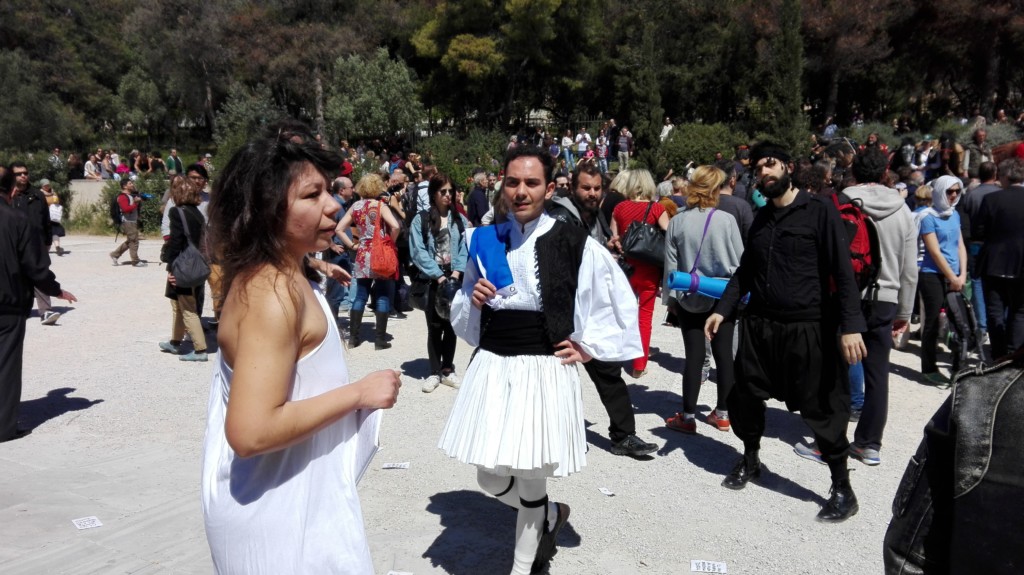
AS: Where does indigeneity come into this?
FI: To be honest I never fully understood when the Greeks became indigenous for documenta. And why describe them as such without them choosing to use this term themselves. Surely this is colonial talk? More importantly, none of this remotely relates to the history of Greece. Greece has centuries of racial complexity. There aren’t really indigenous people here. Only the Nazis say the Greeks have a long-running DNA. Only ultra-patriotic right wing people say that.
AS: So you use the term “indigenous” ironically here? Dressed in your “ethnic” Greek clothes?
FI: The term that we like to use for our actions is over-dentification—instead of criticising something, you become a more monstrous version of it. It’s something that Žižek uses for the work of Slovenian band, Laibach. Ok, so we’re not as thorny or as high budget as that but we like the idea that instead of saying “this is problematic”, you create a haze around that.
This work really puzzled a lot of people. When we finished the catwalk, a lot of journalists from Germany, Sweden and Copenhagen asked us what we meant by it and they really wanted us to say that we were ironic and are against patriotism but instead we decided we weren’t going to say that—we said we wanted to continue the legacy of racial purity. We have arrived at a point where art really ought to have a clear position. It’s not really allowed to be dialectical, to be obscure. The only way those journalists were going to write about us is if we gave them a stamp of approval saying we are not being separatists etc. We wanted them to make up their own mind. In the end they did not write about it.
AS: It does seem that people need to be told more explicitly what to think about art. Or is it just that curators are taking more ownership over the process of “making sense of it all”?
FI: Isn’t it interesting that after 100 years of Dada and Fluxus, that now when you do a performance it ought to be a sort of lecture, with referencing and so on. I still firmly believe that art ought to ask questions rather than give answers and solutions. It can also do that but one of its primary aims is surely to make us think. For me, the whole of documenta and our critical discussion within it has been very enlightening in terms of thinking about where political conceptual art is today. Some critics ask, “why create fuzzy spectacles in a time of Post-Truth and Trump who appropriate these tools in the name of totalitarianism?” I am all for accepting the failures of our methods, but what I’m adamant in not accepting is institutions only advocating works that supposedly pose solutions.
When the Athens Biennale opened, we played again with stereotypes with a performance called Waiting for the Barbarians which is an unclear statement in terms of who the barbarians are. Who’s waiting for whom? It was about Othering essentially. We created a series of characters: one was a post-truth geek and one was an art-dealer capitalist, one was a feminine mystic creature. We created 5 really problematic characters. I was the local hero and spoke about the land and local products etc. So we all played counter-roles to our own which was interesting psychoanalytically in many ways—we actually felt really ill for three days after. The next day Paul Preciado wrote that it’s interesting that the Athens Biennale is doing a patriotic neo-conservative spectacle and I’m thinking: “either you are not very clever or you are being purposefully not very clever because your voice is much louder so you can rewrite history”.
AS: I actually found the whole documenta experience to be very prescriptive and in this kind of fabricated ahistorical bubble.
FI: Absolutely. I think this is part of the angst of documenta—to be this politically edgy thing—but my problem with it is that at the same time, it wasn’t a political thing at all as it wasn’t analytical enough. They didn’t get the cutting edge of post-colonial theory or anti-art or queer discourse already happening here. They included [Greek] artists who had never dealt with those subjects in their artwork before.
Ai Weiwei came and made a tent and an artist studio next to the shores where people were drowning, but there was no critique of how this was taking advantage. It wasn’t even along the lines of NGO art. It was a mercy spectacle that really started making you think about the limits of art discourse. How can you make works about refugees if you’re not a refugee yourself? Like yes, I know you’re wanted by the Chinese government, but you are also a millionaire who is photographing himself as the little Turkish boy who was found dead. Calling it superficial is letting them go a little easily. It’s worse than that. It’s really taking advantage; the coolness of art now is to do political art. We exist in this milieu of political art—we’re not making abstract expressionism anymore because it’s uncool.
AS: I liked your Documena video tours. The ones that were in English were quite abrupt in terms of the language used. Even, dare I say it, politically incorrect?
FI: In our videos we create these characters that we consider situationist critiques of what is going on—and they are indeed partly conspiracy monsters. We use a lot of horrible Greek discourses of common sense. I don’t know how well it translates. When we go around the conservatory, we’re talking about the former director of the Museum of Fine Arts who is in a wheelchair and we make a politically incorrect joke about documenta firing her so they could hire someone who could walk because it was really difficult to walk around those spaces. A really bad taste joke, but actually it did happen this way. She was replaced. People should have a guilty pleasure when they watch what we’re doing and go beyond the awfully problematic oversimplification. The main issues are that documenta did replace her and that the space isn’t accessible. These characters are not ones that people should identify with. They are little collective consciousness monsters that speak truths. It’s a dangerous territory.
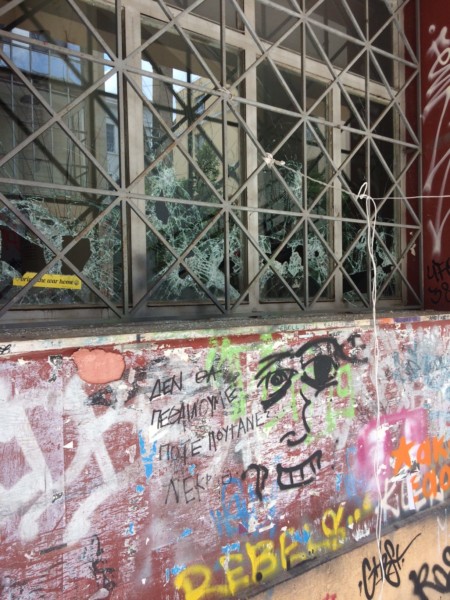
AS: I also found the more bodily sensorial reactions to the works really funny. Talk of “chills” and so forth that evoke the kind of spectatorship that people are guided to experience in large scale exhibition spaces.
FI: It was always going to have a morning TV show vibe. The performativity was what makes the project absurd. There’s a mixture of post-colonial critique with really basic camp performativity—channelling the conservative imagination of what our grandparents would think if they visited this exhibition and what they would have said.
The kind of discourse of the Greeks who go to the New Museum and are proud. Spectacle culture around big works and new age approaches (chills etc)—“makes you think”. Even when one of us makes a serious critique, the other one of us would say something to camp it up. We want to demystify the notion of art criticism. We think art has a key role in power and academia. But there was also a need to incorporate this critique of the spectacle of it all and the fairly ugly side to this idea of Greek common sense. These are very difficult characters because occasionally they are hitting something on the head but they are doing it in this very manipulative kind of way. It’s a dangerous game. Watching it, the audience should be like “that’s interesting, that’s interesting, that’s awful, that’s awful” and so you have to be alert at all times. We don’t allow you to identify or to become passive.
AS: What was your relationship to documenta at the outset?
FI: A year ago I went to an event of theirs at the Polytechnic and that was when they said it was going to be called “Learning from Athens”. There was one presentation that spoke about trans people’s bodies and their architecture, making an architecture design parallel to buildings in the city that are left derelict. If it was done by someone who was even remotely connected to trans scenes in Greece, it could have been a really heartbreaking emotional piece. But they weren’t. It was a number of cis people talking about trans trauma as a design element. Ouch.
We immediately thought that this wasn’t going to go down well. We waited a few months to see what happened and indeed the public program came out as such. How can you claim that one of the public program’s main subjects is “queer” and include hardly any of the local activist movement?
You’re just doing a safari—another typical colonial, fetishising strategy. When I saw the line-up for 34 Exercises of Freedom with only three things that connect with queer activism in Greece and many people who have never previously been involved in any queer spaces, it was particularly hurtful to me. Myself and a number of people have been working on the queer art scene for nearly 10 years; so some days it made us angry and other days made us despair.
AS: Was there much of a backlash when documenta settled in Athens? Beyond the academic/art elite?
FI: Something that not many people know about is that documenta’s offices are in the same offices as the biennale’s offices. We are on the fourth floor and documenta are on the third floor. It’s in Exarchia, which is where the bohemian anarchist square is—where riots happen all the time. In their imagination, the documenta people thought it’d be good to be there because it’s bohemian and so on and because they are on the streets fighting (lol). One day we were having a meeting, and we suddenly hear all this breaking glass and loud noises. Really scary. A group had broken down the documenta door, windows and broken things. documenta haven’t said anything, no public announcement or anything. We are the holders of this secret, which I am telling you here for the first time.
Adam Szymczyk came to our office and asked if it was neonazis, Golden Dawn. And I was thinking, “are you from this planet, do you realise what kind of neighbourhood you decided to put your offices in?” They wrote with spray paint on the wall “underground”. Why would the Nazis do that? What kind of Nazis are so aware of the institutional instrumentalisation of political art? OK, Athens may be the new cool, but we’re not as far yet as to have intersections of art activism and neonazism (lol). He asked us who did it and we said “anarchists of course”. Like, have you read the articles that have come out saying that you don’t pay people very much and you’re appropriating activist language and so on? Why would Nazis write “underground”??
AS: Wow
FI: It really shocked me that they didn’t even consider that they’re treading on territory that militant situations could arise in. It makes total sense. I didn’t think that the action was particularly interesting. I think it’s Greeks being anarchists as always. What was interesting was that the director of documenta, the first thing that came into his mind was that he had been attacked by Nazis because they’re so culturally sensitive and progressive—and not attacked by, you know, anti-art situationists. Isn’t it shocking? He decided not to go out and mention that anarchists had attacked documenta because it would ruin their bohemian reputation.
I think they should have done it out of respect for the people working in the offices and what a traumatic experience this must have been for them. So, what did they learn from Athens? Has anyone ever translated any posters for them in Exarchia in terms of art and gentrification? I’m not saying that I like the Exarchia posters, a lot of their language is macho. You know, manarchist. If you are to understand Exarchia, one of the first things to know would be that it is this kind of anarchistic anti-establishment at-all-costs space, which means that documenta has no place there. In fact, I was surprised that they weren’t attacked earlier if anything. That was the way I felt. The very fact that they weren’t aware that they could be the targets of this kind of militant criticism is bizarre. It shows how far political art institutions are from reality, really.
